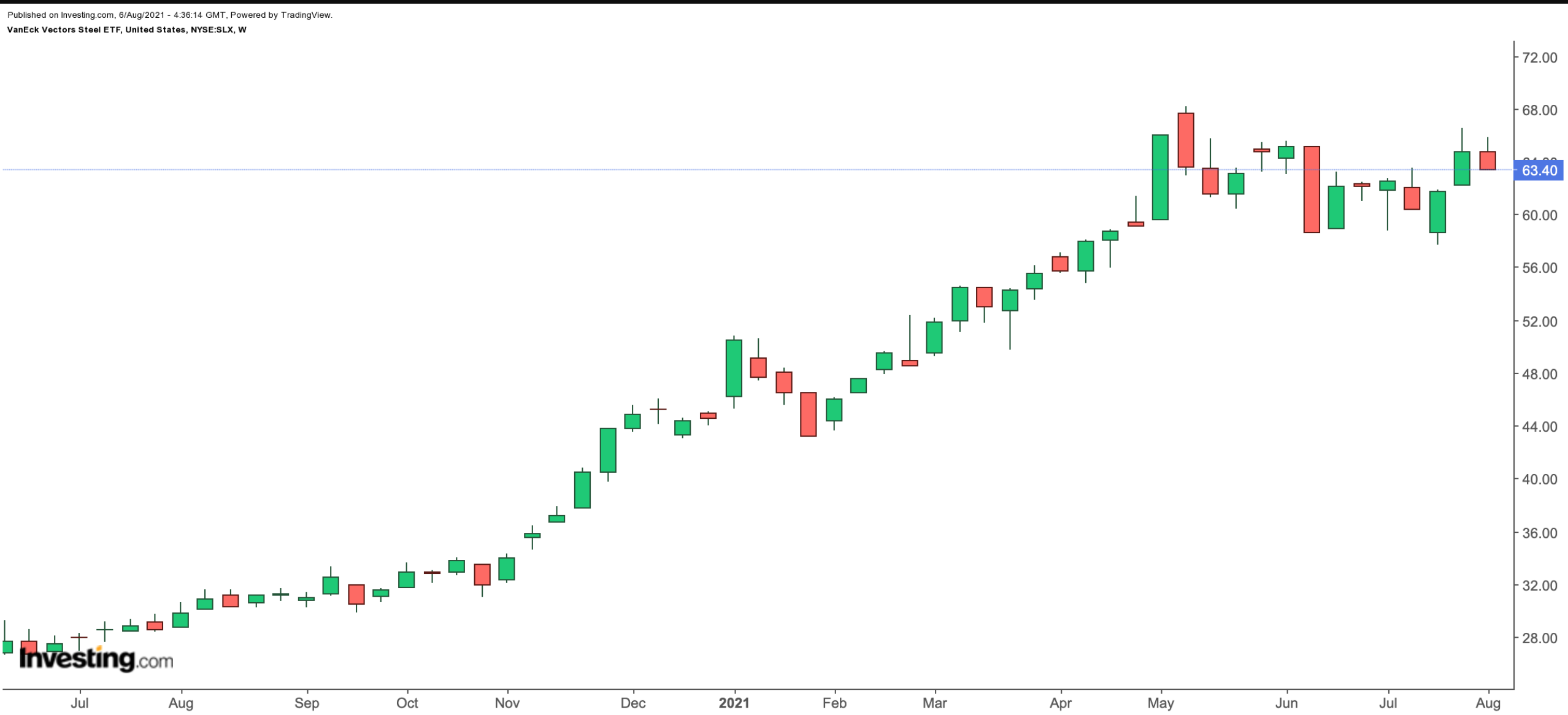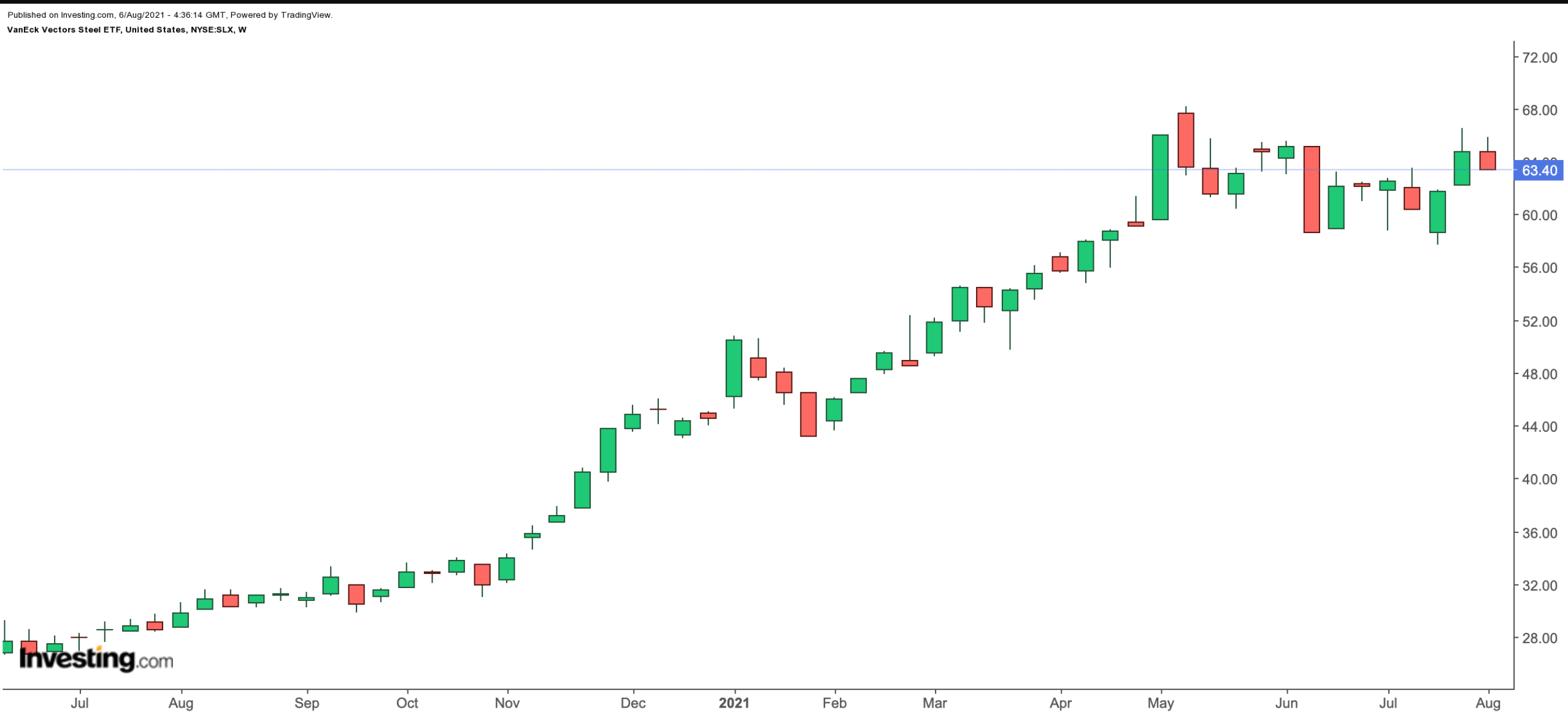A new bipartisan infrastructure deal in the US might have the green light from the Senate soon. The initiative would cover transportation (i.e., roads, airports, ports and electric vehicle charging stations), broadband and utilities, including water systems and power.
According to a recent report by McKinsey:
“In 2015, the non-partisan Congressional Budget Office estimated that every dollar spent on infrastructure brought an economic benefit of up to $2.20. The US Council of Economic Advisers has calculated that $1 billion of transportation-infrastructure investment supports 13,000 jobs for a year. Beyond the numbers, infrastructure is critical to the health and well-being of the country.”
As infrastructure spending increases, a number of stocks are likely to benefit. Therefore, today we introduce two exchange-traded funds (ETFs) that give access to a diversified basket of infrastructure and clean energy businesses.
1. VanEck Vectors Steel ETF
Current Price: $63.40
52-Week Range: $29.47 - $68.22
Dividend Yield: 1.30%
Expense Ratio: 0.56% per year
The VanEck Vectors Steel ETF (NYSE:SLX) invests in businesses in the steel sector. The fund started trading in October 2006 and has around $191 million in assets.

Many industries worldwide rely on steel. Deloitte highlights these industries include: “the defense industry, transportation and heavy engineering, energy and construction (including aeronautical and shipping construction). Moreover, the iron and steel industry is closely related to the chemical industry and light industry.”
China is currently the top steel producer, followed by India, Japan and the US. On the demand side, China is the largest consumer of steel.
SLX, which has 26 holdings, tracks the returns of the NYSE Arca Steel Index. A third of the companies in the ETF come from the US. Next in line are Brazil (24.96%), Australia (14.68%) and the Netherlands (9.38%). The fund’s top 10 holding account for 73% of the fund.
Iron ore producer Vale (NYSE:VALE), miner Rio Tinto (NYSE:RIO), as well as steel and steel products manufacturers ArcelorMittal (NYSE:MT), Nucor (NYSE:NUE) and POSCO (NYSE:PKX) lead the names in SLX.
Over the past year, the fund is up about 122%, and hit a multi-year high in May. A large number of the companies in the fund are likely to benefit from demand for both infrastructure and automotive steel, not only from the US, but also from China and India. For buy-and-hold investors, a potential decline toward the $60 level would improve the margin of safety.
2. SPDR S&P Kensho Intelligent Structures ETF
Current Price: $46.26
52-Week Range: $30.96 - $49.00
Dividend Yield: 0.89%
Expense Ratio: 0.45% per year
The SPDR S&P Kensho Intelligent Structures (NYSE:SIMS) invests in innovative businesses that are involved in intelligent and connected infrastructure. These companies typically focus on smart buildings, smart power grids, intelligent water infrastructure and intelligent transportation infrastructure.

SIMS, which has 54 holdings, tracks the S&P Kensho Intelligent Infrastructure Index. The fund started trading in December 2017. In terms of sectors, we see electrical components and equipment (13.03%), followed by industrial machinery (11.66%) and building products (8.99%). The top 10 names comprise 26% of net assets of $51.7 million.
Leading names in the roster include Carrier Global (NYSE:CARR), which provides solutions for sustainable healthy buildings, heating, ventilation and air conditioning (HVAC), and commercial and transport refrigeration; technology group Silicon Laboratories (NASDAQ:SLAB), which builds semiconductors and software for industrial automation and Internet of Things (IoT) infrastructure; the UK-based Atlantica Sustainable Infrastructure (NASDAQ:AY), which provides renewable energy solutions; and provider of radio frequency systems Qorvo (NASDAQ:QRVO).
The ETF returned 41% in the past year, and saw an all-time high in June. We believe the fund could continue to power up investor portfolios in the near future as well. A potential decline toward $43 would improve the risk/return profile for long-term buyers.
